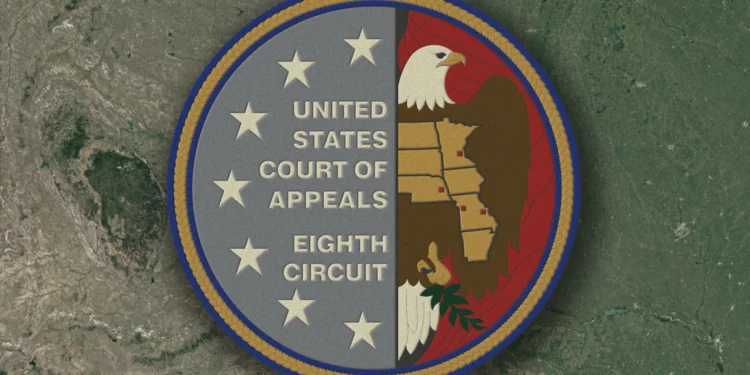July 28, 2025 Story by: Publisher
The U.S. Court of Appeals for the Eighth Circuit ruled that private individuals and civil rights organizations may not bring lawsuits to enforce Section 208 of the Voting Rights Act of 1965. This provision guarantees that voters who need assistance due to disability, blindness, or inability to read or write are entitled to receive help from a person of their choosing when casting a ballot.
The decision, handed down by a three-judge panel, marks a major setback for voting rights advocates and adds to the growing erosion of the Voting Rights Act’s enforcement mechanisms—shifting authority away from private litigants and concentrating it almost entirely within the U.S. Department of Justice (DOJ).
The Eighth Circuit’s jurisdiction covers Arkansas, Iowa,Minnesota, Missouri, Nebraska and North Dakota meaning voters in those states will no longer have any direct remedy when those rights are violated.
What Is Section 208 of the Voting Rights Act?
Enacted in 1982 as part of the Voting Rights Act amendments, Section 208 was designed to protect access to the ballot for voters who, due to physical or language-based limitations, require assistance. It allows such individuals to bring a helper of their choice into the voting booth—so long as the assistant is not the voter’s employer or union representative.
The provision has been critical in enabling civic participation for disabled voters, older adults with mobility or dexterity challenges, and language minority communities, especially in states that lack robust translation or accessible ballot programs.
Who it protects:
- Voters with physical disabilities or mobility limitations
- Blind or visually impaired individuals
- Elderly voters with dexterity or cognitive issues
- Voters who cannot read English (or their ballot) due to limited literacy or language barriers
Section 208 lawsuits have been used to challenge:
- State laws limiting who can assist voters in person or by mail.
- Restrictions on ballot return for elderly or disabled voters in nursing homes.
- Rules that ban translators from assisting voters who are not literate in English or their spoken language.
Until now, private parties—including disability rights groups, community organizations, and individual voters—could sue states or local jurisdictions that violated Section 208. The Eighth Circuit’s ruling eliminates that private right of enforcement in the seven states it governs: Arkansas, Iowa, Minnesota, Missouri, Nebraska, North Dakota, and South Dakota.
Arkansas State Conf. NAACP v. Arkansas Bd. of Apportionment
The ruling mirrors a previous Eighth Circuit decision in Arkansas NAACP v. Arkansas Board of Apportionment, where the same court held that there is no private right to sue under Section 2 of the Voting Rights Act—a core provision used to challenge racial vote dilution. That case is currently on appeal to the U.S. Supreme Court.
The 8th Circuit ruling stemmed from a redistricting lawsuit filed in December 2021 on behalf of the Arkansas State Conference of the NAACP and the Arkansas Public Policy Panel. The groups alleged that a state House map passed after the release of 2020 census data weakened the impact of Black votes, which violates Section 2 of the VRA.
The ruling overturns a 2023 North Dakota district‑court decision that found the state’s 2021 legislative redistricting diluted Native American voting strength. That lower‑court order reshaped districts to boost representation, resulting in the election of three Native legislators.
But the 8th Circuit reversed. It instructed the district court to dismiss the suit—not on the merits of discrimination, but due to the absence of a private enforcement pathway.
On December 29, 2021, the Arkansas State Conference of the NAACP and an Arkansas non-profit filed a federal lawsuit against the State of Arkansas, the Arkansas Board of Apportionment, and the State’s Governor, Secretary of State, and Attorney General challenging the Board’s state House redistricting plan as diluting Black voters’ voting strength in violation of Section 2 of the Voting Rights Act (“VRA”). They sought a judicial declaration that the plan violated the VRA and an injunction barring the plan, or any other unlawful plan, from being used in future elections.
On February 17, 2022, the district court held that it lacked jurisdiction to hear the plaintiffs’ claims on the grounds that Section 2 of the VRA did not provide a cause of action for private citizens to enforce its requirements. Rather than dismiss the suit, the court gave the U.S. Attorney General 5 days to decide whether to join the case as a plaintiff.
On February 22, 2022, the United States informed the court it would not be joining the case. That same day, the court dismissed the case and on February 23, 2022, the plaintiffs appealed to the U.S. Court of Appeals for the Eighth Circuit.
Oral arguments before the 8th Circuit were held on January 11, 2023. The court issued an opinion on November 20, 2023, affirmed the district court.
On January 30, 2024, the Eighth Circuit Court of Appeals declined to rehear the case en banc.
The case centers on a recent ruling by a divided panel that determined private individuals and civil rights organizations cannot enforce Section 2 of the Voting Rights Act through 42 U.S.C. § 1983.
A blow to disability and language access at the polls
Section 208 is vital in protecting the rights of people who cannot vote independently due to disability or language barriers.
For example:
- In Texas, Section 208 was used to successfully challenge a law that criminalized interpreters who helped voters navigate the ballot.
- In Georgia, it was cited in efforts to ensure that voters with mobility impairments could receive help in entering polling places and marking ballots.
The removal of private enforcement power leaves millions of Americans—especially seniors, low-income individuals with limited literacy, and non-English-speaking citizens—vulnerable to unchallenged local election rules that may violate federal protections.
The DOJ can’t carry the burden
What was true in 1961 remains a reality today: In the face of overt discrimination, it’s voters, not the government, who primarily seek relief in the courts. In the last 40 years, individuals and organizations have been the primary drivers of lawsuits enforcing the Voting Rights Act, bringing 93 percent of Section 2 cases. Of the more than 400 Section 2 claims brought in federal court, at least 197 were successful.
Sources: Democracy Docket / Brennan Center for Justice / Democracy Docket

















